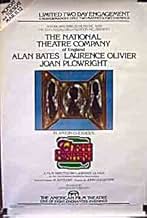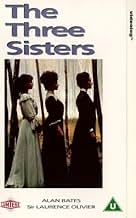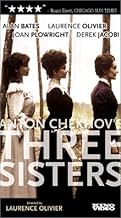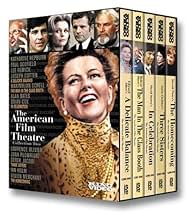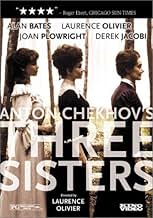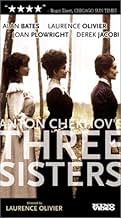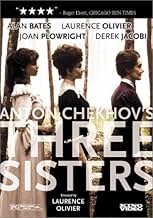Ajouter une intrigue dans votre langueNearly a thousand miles away from their beloved Moscow, Chekhov's Three Sisters live in virtual exile. Olga, a schoolmistress, attempts to support her siblings and the home that is the sole ... Tout lireNearly a thousand miles away from their beloved Moscow, Chekhov's Three Sisters live in virtual exile. Olga, a schoolmistress, attempts to support her siblings and the home that is the sole legacy of their late father.Nearly a thousand miles away from their beloved Moscow, Chekhov's Three Sisters live in virtual exile. Olga, a schoolmistress, attempts to support her siblings and the home that is the sole legacy of their late father.
- Directors
- Writers
- Stars
Avis en vedette
Having a Russian background, I saw many productions of one of the most famous Chekhov's plays. I'd say the Olivier's "Three sisters" is the best of all I've ever seen. Even if there are some inaccuracies in details related to the Russian 19th century realities, the Olivier's n-depth understanding of the complicated Chekhov's work is amazing.
This fourth and final feature film directed by Laurence Olivier is his only one not based on Shakespeare or with himself in the title role. Itself now fifty years old, hence the startlingly youthful appearances of National Theatre alumni like Derek Jacobi and Sheila Reid as Andrei and his wife Natasha.
Described by Olivier as "a celebration of the acting rather than a thoroughly conceived filmic version of the play", the settings and groupings often resemble those of a German silent film while the costumes anticipate Bergman's 'Cries and Whispers'. Olivier's camera however glides about the set and cuts in lively pursuit of the Prosorov sisters as they dream their dreams of Moscow's bright lights.
Described by Olivier as "a celebration of the acting rather than a thoroughly conceived filmic version of the play", the settings and groupings often resemble those of a German silent film while the costumes anticipate Bergman's 'Cries and Whispers'. Olivier's camera however glides about the set and cuts in lively pursuit of the Prosorov sisters as they dream their dreams of Moscow's bright lights.
In turn of the century rural Russia, the aristocratic daughters of a dead colonel each have their own dreams and aspirations.
Laurence Olivier's own stagey adaptation of Anton Chekhov's play has at times some minimal sets and stage decoration. Adapted from one of Chekhov's best known plays makes for an overlong and at times tedious viewing. There is something cliched in this well intentioned film does little to elevate the cliches.
Laurence Olivier's own stagey adaptation of Anton Chekhov's play has at times some minimal sets and stage decoration. Adapted from one of Chekhov's best known plays makes for an overlong and at times tedious viewing. There is something cliched in this well intentioned film does little to elevate the cliches.
A fine, sensitive filming of a fine stage production of Chekhov's masterpiece THE THREE SISTERS. A few of the actors are a bit too broad and stagey (especially the oldest sister, the schoolteacher), reflecting inexperience acting for the camera, but that's a minor flaw.
What's up with the sound? I rented the DVD and the sound track is terrible for a film from this period. It's hard to make out some of the dialogue, especially when a character turns away from the camera. I hate having to strain to hear dialogue, especially dialogue by Chekhov! It seems to be a recording problem. The film was shot on what seem to be massive stage sets. This family's provincial home looks roughly the size of the Winter Palace. I'm guessing the cavernous sets swallowed up and muffled the dialogue, resulting in the poor sound quality.
Aside from the deficiencies of the sound (and there's no excuse for such a problem in a production from 1970 -- fire that sound engineer!) it's a great production of a gently funny and bittersweet classic play.
What's up with the sound? I rented the DVD and the sound track is terrible for a film from this period. It's hard to make out some of the dialogue, especially when a character turns away from the camera. I hate having to strain to hear dialogue, especially dialogue by Chekhov! It seems to be a recording problem. The film was shot on what seem to be massive stage sets. This family's provincial home looks roughly the size of the Winter Palace. I'm guessing the cavernous sets swallowed up and muffled the dialogue, resulting in the poor sound quality.
Aside from the deficiencies of the sound (and there's no excuse for such a problem in a production from 1970 -- fire that sound engineer!) it's a great production of a gently funny and bittersweet classic play.
Caught this on Talking Pictures and was really impressed. I have seen the play before on stage and think of it as a dreary piece, but this version has changed my opinion. It is the most naturalistic performanceI I have ever seen Laurence Olivier do. There is a lovely performance by Louise Purnell who I recently caught during lockdown when I dug out an old box set of Forsyte Saga. It was also interesting to see a very young Ronald Pickup and Derek Jacobi. I was most impressed. Additionally it was good to see the excellent Alan Bates who had replaced Robert Stephens who was ill. Some reviews mention poor sound but everything was clear and there were no problems,
Le saviez-vous
- AnecdotesThis was one of two British made adaptations of Anton Chekhov's 1900 play "Three Sisters" released in 1970. The other was The Three Sisters (1970).
- Citations
Ferrapont the watchman: What are papers for, if not to be signed?
- ConnexionsFeatured in Nothing Like a Dame (2018)
Meilleurs choix
Connectez-vous pour évaluer et surveiller les recommandations personnalisées
- How long is Three Sisters?Propulsé par Alexa
Détails
- Durée2 heures 45 minutes
- Mixage
- Rapport de forme
- 1.85 : 1
Contribuer à cette page
Suggérer une modification ou ajouter du contenu manquant

Lacune principale
By what name was Three Sisters (1970) officially released in India in English?
Répondre

